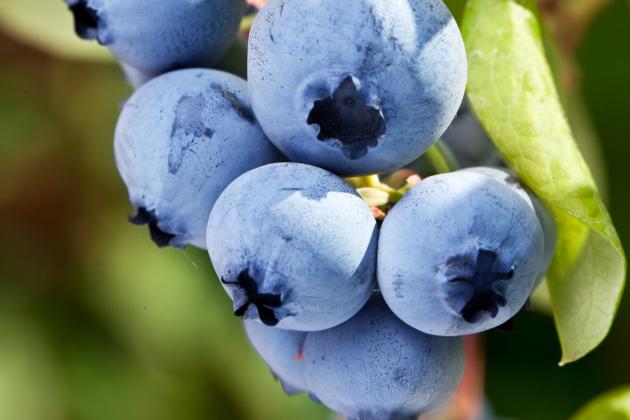
Strawberries & Other Berries
Developing a nutrition plan for the production of strawberries, as well as other berries (this includes blueberries, raspberries and other cane berries, and cranberries) is essential to maximize yield, quality, and overall profits to the grower. Berry crops are typically high value crops that require intensive investment to produce economical yields. Delivering the proper nutrient needs at the right crop growth stages will lead to healthy plants that will produce quality fruit.
Generally, most berries prefer slightly acidic soils. In the case of blueberries, a pH of 4.0 to 5.5 is ideal. For most other berries, a pH between 5.5 and 7.0 is preferable. Thiosulfate fertilizers are a perfect fit for fertilization of berry crops because they not only provide essential mineral nutrients (nitrogen, potassium, calcium, and sulfur), but also generate acidity in the soil that helps to maintain slightly acidic conditions. Berries also tend to be sensitive to chlorides, so fertilizers containing chloride should be avoided. Often, berry crops are irrigated using drip irrigation. Because of this, liquid fertilizers are particularly effective for use in fertigation to deliver nutrients directly to plant roots.
Producers are often rewarded for larger, sweeter, and firmer berries. Our Crop Vitality product portfolio addresses your crop nutrition needs by providing immediately available nutrients to the roots.
Here are some recommendations for using Crop Vitality products in your operation:
-

Calcium
Ensuring berry plants have enough calcium is critical to optimizing yield and quality. Strawberries especially can exhibit leaf tip burn and overall stunted growth when calcium is deficient. Additionally, calcium is often referred to as the "storage nutrient.” It plays a crucial role in cell wall strength, which is the first line of defense against various physiological conditions. Adequate calcium has been shown to decrease bruising during transport and increase the overall shelf life of berries. The highly soluble calcium in CaTs® ensures calcium is available when the plant needs it most. The liquid formulation allows for easy and convenient application through irrigation systems. CaTs can be applied throughout the growing season, targeting key growth stages such as bloom and early berry formation. It can also be applied with nitrogen fertilizers (including UAN, urea solutions, AN-20) to provide calcium and sulfur along with essential nitrogen.
-

Potassium
Proper potassium nutrition directly impacts the quantity and size of harvested berries. Potassium helps to increase berry size, raise sugar content (Brix), and influences fruit coloration. Potassium is also important in mitigating drought stress and aids in reducing pest and disease pressure. In berry plants, most of the potassium tends to accumulate in the fruit, so applications should be made throughout the growing season. KTS® and K-Row 23® can help achieve better marketable yields in berry production. The thiosulfate-sulfur in KTS can help lower pH, which is especially important for crops like blueberries that thrive in acidic soils. K-Row 23 allows for higher application rates and more flexibility to tailor potassium applications to meet crop demand without acidifying the soil. If acidification is desired, K-Row 23 can be blended with Thio-Sul and water.
-

Nitrogen
Providing the right amount of nitrogen nutrition is a delicate balance. Too little nitrogen could result in poor plant growth, while too much could cause excessive foliar growth and poorly colored fruit. Proper nitrogen nutrition ensures nutrients are efficiently used by the plant. N-Sure® offers extended nitrogen availability to a developing crop over a longer period compared to other nitrogen sources. When applied to the soil, N-Sure releases plant-available nitrogen over 8 to 10 weeks. When applied as a foliar spray, N-Sure acts as a humectant, keeping the leaf surface moist and allowing for direct uptake into the leaf tissue. N-Sure and Thio-Sul® are particularly effective nitrogen fertilizers in blueberry production, as all the nitrogen is or will become ammonium nitrogen (which is preferred by blueberry plants).
-

Sulfur
Sulfur is often referred to as the fourth major nutrient due to its undeniable importance in proper plant function. Adequate sulfur levels are crucial for a profitable crop. Sulfur works synergistically with nitrogen, as both nutrients play roles in protein synthesis, formation of amino acids, and photosynthesis functionality. Thio-Sul, KTS, CaTs, and K-Row 23 all provide essential sulfur, along with additional nutrition to ensure your berries thrive. Thiosulfate sulfur provides the additional benefit of generating soil acidity to help maintain acidic conditions, especially important in blueberry production.
Recommended Insights
-
-

Additional Learning
Check out our library of content geared towards teaching the best crop nutrition practices to growers around the world.
-

Get Local Support
If you're looking for further insights on how Crop Vitality products can help you achieve your yield goals, reach out and a Crop Vitality Specialist will get back to you as soon as possible!
Ask Questions

